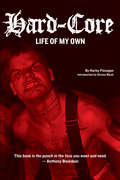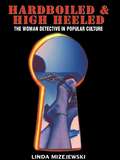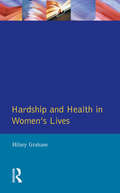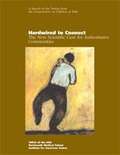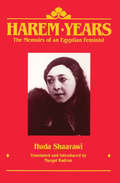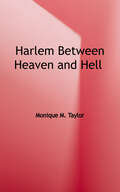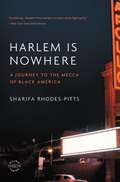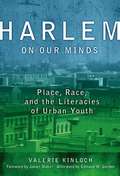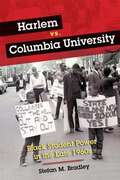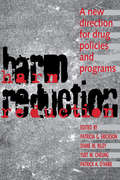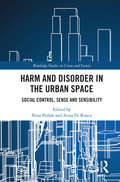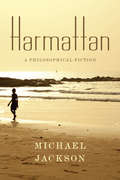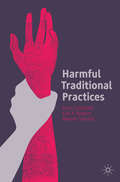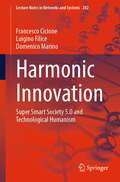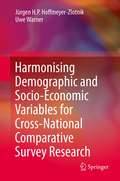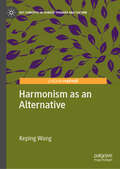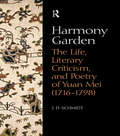- Table View
- List View
Hard-Boiled Sentimentality: The Secret History of American Crime Stories
by Leonard CassutoLeonard Cassuto's cultural history links the testosterone-saturated heroes of American crime stories to the sensitive women of the nineteenth-century sentimental novel. From classics like The Big Sleep and The Talented Mr. Ripley to neglected paperback gems, Cassuto chronicles the dialogue--centered on the power of sympathy--between these popular genres and the sweeping social changes of the twentieth century, ending with a surprising connection between today's serial killers and the domestic fictions of long ago.
Hard-Core Romance: Fifty Shades of Grey, Best-Sellers, and Society
by Eva IllouzFrom its beginnings in Twilight fan-fiction to its record-breaking sales as an e-book and paperback, the story of the erotic romance novel Fifty Shades of Grey and its two sequels is both unusual and fascinating. Having sold over seventy million copies worldwide since 2011, E. L. James’s lurid series about a sexual ingénue and the powerful young entrepreneur who introduces her to BDSM sex has ingrained itself in our collective consciousness. But why have these particular novels—poorly written and formulaic as they are—become so popular, especially among women over thirty? In this concise, engaging book, Eva Illouz subjects the Fifty Shades cultural phenomenon to the serious scrutiny it has been begging for. After placing the trilogy in the context of best-seller publishing, she delves into its remarkable appeal, seeking to understand the intense reading pleasure it provides and how that resonates with the structure of relationships between men and women today. Fifty Shades, Illouz argues, is a gothic romance adapted to modern times in which sexuality is both a source of division between men and women and a site to orchestrate their reconciliation. As for the novels’ notorious depictions of bondage, discipline, and sadomasochism, Illouz shows that these are as much a cultural fantasy as a sexual one, serving as a guide to a happier romantic life. The Fifty Shades trilogy merges romantic fantasy with self-help guide—two of the most popular genres for female readers. Offering a provocative explanation for the success and popularity of the Fifty Shades of Grey novels, Hard-Core Romance is an insightful look at modern relationships and contemporary women’s literature.
Hard-Core: Life of My Own
by Steven Blush Harley FlanaganAs a homeless child prodigy, Harley Flanagan played drums for bands at Max's Kansas City and CBGBs, and was taught to play bass by the famed black band Bad Brains, and drank with the notorious Lemmy of Motörhead. Most famously, Harley became a member of the famous hardcore band The Cro-Mags, and disputes accusations of stabbing two band members.
Hard-to-Survey Populations
by Roger Tourangeau Roger Tourangeau Brad Edwards Timothy P. Johnson Kirk M. Wolter Nancy Bates Brad Edwards Timothy P. Johnson Kirk M. WolterSurveys are used extensively in psychology, sociology and business, as well as many other areas, but they are becoming increasingly difficult to conduct. Some segments of the population are hard to sample, some are hard to find, others are hard to persuade to participate in surveys, and still others are hard to interview. This book offers the first systematic look at the populations and settings that make surveys hard to conduct and at the methods researchers use to meet these challenges. It covers a wide range of populations (immigrants, persons with intellectual difficulties, and political extremists) and settings (war zones, homeless shelters) that offer special problems or present unusual challenges for surveys. The team of international contributors also addresses sampling strategies including methods such as respondent-driven sampling and examines data collection strategies including advertising and other methods for engaging otherwise difficult populations.
Hardboiled and High Heeled: The Woman Detective in Popular Culture
by Linda MizejewskiCan a gumshoe wear high heels? In a genre long dominated by men, women are now taking their place-as authors and as characters-alongside hard-boiled legends like Sam Spade and Mike Hammer. Hardboiled and High Heeled examines the meteoric rise of the female detective in contemporary film, television, and literature. Richly illustrated and written with a fan's love of the genre, Hardboiled and High Heeled is an essential introduction to women in detective fiction, from past to present, from pulp fiction to blockbuster films.
Hardship & Health Womens Lives
by Hilary GrahamFirst published in 1993. Routledge is an imprint of Taylor & Francis, an informa company.
Hardwired To Connect: The New Scientific Case for Authoritative Communities
by Commission on Children at Risk StaffLarge and growing numbers of U.S. children and young people are suffering from depression, anxiety, attention deficit, conduct disorders, thoughts of suicide, and other serious mental and behavioral problems. Why? What can be done to reverse this trend? In this pioneering report, the Commission on Children at Risk, a panel of 33 leading children's doctors, neuroscientists, research scholars and youth service professionals, draw upon a large body of recent research showing that children are biologically primed ("hardwired") for enduring connections to others and for moral and spiritual meaning. The authors introduce a new public policy and social science term -- authoritative communities -- to describe the ten essential traits across social institutions that produce better outcomes for children. The report proposes three major social goals and makes 18 recommendations for social and public policy change.
Harem Years: The Memoirs of an Egyptian Feminist
by Huda ShaarawiA firsthand account of the private world of a harem in colonial Cairo—by a groundbreaking Egyptian feminist who helped liberate countless women. In this compelling memoir, Shaarawi recalls her childhood and early adult life in the seclusion of an upper-class Egyptian household, including her marriage at age thirteen. Her subsequent separation from her husband gave her time for an extended formal education, as well as an unexpected taste of independence. Shaarawi&’s feminist activism grew, along with her involvement in Egypt&’s nationalist struggle, culminating in 1923 when she publicly removed her veil in a Cairo railroad station, a daring act of defiance. In this fascinating account of a true original feminist, readers are offered a glimpse into a world rarely seen by westerners, and insight into a woman who would not be kept as property or a second-class citizen.
Harlan Ellison's Watching: Essays and Criticism
by Harlan EllisonOstensibly, this is a collection of Harlan Ellison's twenty-five years of essays and film criticism for various publications. What it is in reality is pure, raw, unapologetic opinion. Star Wars? "Luke Skywalker is a nerd and Darth Vader sucks runny eggs." Big Trouble in Little China? "A cheerfully blathering live-action cartoon that will give you release from the real pressures of your basically dreary lives." Despite working within the industry himself, Ellison never learned how to lie. So punches go un-pulled, the impersonal becomes personal, and the reader is left feeling like they have read something someone actually meant. It is a gauntlet, for sure, but it is also an exhilarating release.
Harlem Between Heaven and Hell
by Monique M. TaylorHarlem is used as an emblem of black progress in the candid study that takes a hard look at race, class, and gentrification among African Americans,
Harlem Is Nowhere: A Journey to the Mecca of Black America
by Sharifa Rhodes-PittsFor a century Harlem has been celebrated as the capital of black America, a thriving center of cultural achievement and political action. At a crucial moment in Harlem's history, as gentrification encroaches, Sharifa Rhodes-Pitts untangles the myth and meaning of Harlem's legacy. Examining the epic Harlem of official history and the personal Harlem that begins at her front door, Rhodes-Pitts introduces us to a wide variety of characters, past and present. At the heart of their stories, and her own, is the hope carried over many generations, hope that Harlem would be the ground from which blacks fully entered America's democracy. Rhodes-Pitts is a brilliant new voice who, like other significant chroniclers of places--Joan Didion on California, or Jamaica Kincaid on Antigua--captures the very essence of her subject.
Harlem On Our Minds: Place, Race, and the Literacies of Urban Youth
by Valerie Kinlochher new book, Valerie Kinloch investigates how the lives and literacies of youth in New York City s historic Harlem are affected by public attempts to gentrify the community. Kinloch draws connections between race, place, and students literate identities through interviews with youth, teachers, longtime black residents, and their new white neighbors. Harlem on Our Minds is a participatory action narrative that brings emerging theories of social ecology to life for the high school English classroom. Vividly drawn lessons show how teachers can engage urban youth in school-based literacy by linking canonical text, particularly of the Harlem renaissance, to current events.
Harlem vs. Columbia University: Black Student Power in the Late 1960s
by Stefan M. BradleyIn 1968-69, Columbia University became the site for a collision of American social movements. Black Power, student power, antiwar, New Left, and Civil Rights movements all clashed with local and state politics when an alliance of black students and residents of Harlem and Morningside Heights openly protested the school's ill-conceived plan to build a large, private gymnasium in the small green park that separates the elite university from Harlem. Railing against the university's expansion policy, protesters occupied administration buildings and met violent opposition from both fellow students and the police. In this dynamic book, Stefan M. Bradley describes the impact of Black Power ideology on the Students' Afro-American Society (SAS) at Columbia. While white students--led by Mark Rudd and Students for a Democratic Society (SDS)--sought to radicalize the student body and restructure the university, black students focused on stopping the construction of the gym in Morningside Park. Through separate, militant action, black students and the black community stood up to the power of an Ivy League institution and stopped it from trampling over its relatively poor and powerless neighbors. Bradley also compares the events at Columbia with similar events at Harvard, Cornell, Yale, and the University of Pennsylvania.
Harlot or Holy Woman?: A Study of Hebrew Qedešah
by Phyllis A. BirdHarlot or Holy Woman? presents an exhaustive study of qedešah, a Hebrew word meaning "consecrated woman" but rendered "prostitute" or "sacred prostitute" in Bible translations. Reexamining biblical and extrabiblical texts, Phyllis A. Bird questions how qedešah came to be associated with prostitution and offers an alternative explanation of the term, one that suggests a wider participation for women as religious specialists in Israel’s early cultic practice.Bird’s study reviews all the texts from classical antiquity cited as sources for an institution of "sacred prostitution," alongside a comprehensive analysis of the cuneiform texts from Mesopotamia containing the cognate qadištu and Ugaritic texts containing the masculine cognate qdš. Through these texts, Bird presents a portrait of women dedicated to a deity, engaged in a variety of activities from cultic ritual to wet-nursing, and sharing a common generic name with the qedešah of ancient Israel. In the final chapter she returns to biblical texts, reexamining them in light of the new evidence from the ancient Near East.Considering alternative models for constructing women’s religious roles in ancient Israel, this wholly original study offers new interpretations of key texts and raises questions about the nature of Israelite religion as practiced outside the royal cult and central sanctuary.
Harlot or Holy Woman?: A Study of Hebrew Qedešah
by Phyllis A. BirdHarlot or Holy Woman? presents an exhaustive study of qedešah, a Hebrew word meaning “consecrated woman” but rendered “prostitute” or “sacred prostitute” in Bible translations. Reexamining biblical and extrabiblical texts, Phyllis A. Bird questions how qedešah came to be associated with prostitution and offers an alternative explanation of the term, one that suggests a wider participation for women as religious specialists in Israel’s early cultic practice.Bird’s study reviews all the texts from classical antiquity cited as sources for an institution of “sacred prostitution,” alongside a comprehensive analysis of the cuneiform texts from Mesopotamia containing the cognate qadištu and Ugaritic texts containing the masculine cognate qdš. Through these texts, Bird presents a portrait of women dedicated to a deity, engaged in a variety of activities from cultic ritual to wet-nursing, and sharing a common generic name with the qedešah of ancient Israel. In the final chapter she returns to biblical texts, reexamining them in light of the new evidence from the ancient Near East.Considering alternative models for constructing women’s religious roles in ancient Israel, this wholly original study offers new interpretations of key texts and raises questions about the nature of Israelite religion as practiced outside the royal cult and central sanctuary.
Harm Reduction
by Patricia G. Erickson Diane M. Riley Yuet W. Cheung Pat A. O'HareSince the First International Conference on the Reduction of Drug-Related Harm, held in 1990, the term 'harm reduction' has gained wide currency in the areas of public health and drug policy. Previously the field was characterized by heated struggle between prohibition and legalization of addictive substances, and this debate tended to obscure practical, collective approaches. Harm reduction, an approach which encompasses various policy directives and program initiatives was inspired by the positive outcomes of such public measures as needle-exchange programs for reduction of HIV risk, methadone maintenance programs, education on the risks of tobacco use, and programs designed to limit alcohol consumption.The essays in this book illustrate the scope and vigour of the emerging harm reduction model. The essays, drawn from seven international conferences on harm reduction, cover a wide variety of topics, including public policy, women and reproductive issues, the experiences of special populations, human rights; defining and measuring harm, and intervention.Researchers and practitioners will benefit from the varied papers in the volume, which combine insights into policy-making and front-line outreach efforts with comprehensive conceptual and empirical approaches. Harm Reduction represents an important initiative in making academic work accessible and useful to a larger community, and provides guidance for the development of effective policies and programs.
Harm Reduction, Second Edition
by G. Alan Marlatt Mary E. LarimerFrom addictions treatment pioneer G. Alan Marlatt and associates, this is the authoritative work on harm reduction: its principles, strategies, and practical applications. Contributors review programs that have been developed and tested for a range of high-risk behaviors, including problem drinking, tobacco use, illicit drug use, and risky sexual behavior. Flexible, tailored, culturally competent treatment approaches are described for marginalized and underserved communities. The volume also explores philosophical and policy-related debates surrounding this growing movement. New to This Edition, Reflects significant advances in research and clinical practice, as well as increasing professional acceptance of the harm reduction model.*Chapters on the current status of the field, applications to psychotherapy, and treatment of dual disorders. Chapters on additional populations (adolescent drinkers and Hispanic/Latino and Asian American substance users) and an additional substance (cannabis).
Harm and Disorder in the Urban Space: Social Control, Sense and Sensibility (Routledge Studies in Crime and Society)
by Nina Peršak; Anna Di RoncoBringing together an international group of authors, this book addresses the important issues lying at the intersection between urban space, on the one hand, and incivilities and urban harm, on the other. Progressive urbanisation not only influences people’s living conditions, their well-being and health but may also generate social conflict and consequently fuel disorder and crime. Rooted in interdisciplinary scholarship, this book considers a range of urban issues, focussing specifically on their sensory, emotive, power and structural dimensions. The visual, audio and olfactory components that offend or harm are inspected, including how urban social control agencies respond to violations of imposed sensory regimes. Emotive dimensions examined include the consideration of people emotions and sensibilities in the perception of incivilities, in the shaping of social control to deviant phenomena, and their role in activating or suppressing people’s resistance towards otherwise harmful everyday practices. Power and structural dimensions examine the agents who decide and define what anti-social and harmful is and the wider socio-economic and cultural setting in which urbanites and social control agents operate. Connecting with sensory and affective turns in other disciplines, the book offers an original, distinctive and nuanced approach to understanding the harms, disorder and social control in the city. An accessible and compelling read, this book will appeal to those engaged with criminology, sociology, human geography, psychology, urban studies, socio-legal studies and all those interested in the relationship between urban space and urban harm.
Harmattan
by Michael JacksonWe all suffer qualms and anxieties when we move from the known to the unknown. Though our fulfillment in life may depend on testing limits, our faintheartedness is a reminder of our need for security and our awareness of the risks of venturing into alien worlds.Rich with the reflections of a renowned scholar who has worked extensively in many cultures and countries, Harmattan creatively imagines the experience of embracing the unknown. Celebrating the life-giving potential of people, places, and powers that lie beyond our established worlds, Harmattan connects existential vitality to the act of resisting prescribed customs and questioning received notions of truth. At the heart of the book is the fictional story of Tom Lannon, a graduate student from Cambridge University, who remains ambivalent about pursuing a conventional life. After traveling to Sierra Leone in the aftermath of the country's devastating civil war, Tom meets a writer who helps him explore the possibilities of renewal. Illustrating the fact that certain aspects of human existence are common to all people regardless of their culture and history, Harmattan remakes the distinction between home and world and the relationship between knowledge and life.
Harmattan: A Philosophical Fiction (Insurrections: Critical Studies in Religion, Politics, and Culture)
by Professor Michael D. JacksonWe all experience qualms and anxieties when we move from the known to the unknown. Though our fulfillment in life may depend on testing limits, our faintheartedness is a reminder of our need for security and our awareness of the risks of venturing into alien worlds. Evoking the hot, dust-filled Harmattan winds that blow from the Sahara to the Gulf of Guinea, this book creatively explores what it means to be buffeted by the unforeseen and the unknown. Celebrating the life-giving potential of people, places, and powers that lie beyond our established worlds, Harmattan connects existential vitality to the act of resisting prescribed customs and questioning received notions of truth. At the book's heart is the fictional story of Tom Lannon, a graduate student from Cambridge University, who remains ambivalent about pursuing a conventional life. After traveling to Sierra Leone in the aftermath of its devastating civil war, Tom meets a writer who helps him explore the possibilities of renewal. Illustrating the fact that certain aspects of human existence are common to all people regardless of culture and history, Harmattan remakes the distinction between home and world and the relationship between knowledge and life.
Harmful Traditional Practices: Prevention, Protection, and Policing
by Gerry Campbell Karl A. Roberts Neelam SarkariaThis book is about harmful traditional practices: damaging and often violent acts which include female genital mutilation, forced marriage, honour killings and abuse, breast ironing, witchcraft and faith-based abuse. Often targeting women and young girls, these practices are often justified on spurious religious or traditional grounds but are all forms of abuse. Roberts, Campbell and Sarkaria have backgrounds in psychology, policing and law and have spent many years working at the forefront of attempts to end these practices. Harmful Traditional Practices is therefore a uniquely pragmatic book which aims to inform readers about these acts while identifying the best approaches towards ending and prosecuting against them.
Harmonic Innovation: Super Smart Society 5.0 and Technological Humanism (Lecture Notes in Networks and Systems #282)
by Domenico Marino Francesco Cicione Luigino FiliceThis book is aimed at researchers, entrepreneurs, and innovation consultants of the 5.0 era. For many centuries, the dominant paradigm of innovation was based on competition and the protection of the achievements (closed innovation).In the early years of the new millennium, the advent of globalization and the network has made the model evolve towards open and collaborative approaches (open innovation).Both methods corresponded to a different view of the world and society.Today, in a historical phase in which the world needs to become more sustainable and equitable, from the heart of the Mediterranean, the cradle of classical civilization, a group of valuable academics, scholars, and entrepreneurs propose to the world a new and further evolution of the concept of innovation and expression of the era we are living in: the harmonic innovation, an attempt to combine science and wisdom, technique and spirit, scientific research and moral research, technological progress and new humanism, new economy and social impacts, power, and limit.Anybody who aims to discover a fragment of future is welcome to read this book.
Harmonising Demographic and Socio-Economic Variables for Cross-National Comparative Survey Research
by Uwe Warner Jürgen H.P. Hoffmeyer-ZlotnikThis book explains harmonisation techniques that can be used in survey research to align national systems of categories and definitions in such a way that comparison is possible across countries and cultures. It provides an introduction to instruments for collecting internationally comparable data of interest to survey researchers. It shows how seven key demographic and socio-economic variables can be harmonised and employed in European comparative surveys. The seven key variables discussed in detail are: education, occupation, income, activity status, private household, ethnicity, and family. These demographic and socio-economic variables are background variables that no survey can do without. They frequently have the greatest explanatory capacity to analyse social structures, and are a mirror image of the way societies are organised nationally. This becomes readily apparent when one attempts, for example, to compare national education systems. Moreover, a comparison of the national definitions of concepts such as "private household" reveals several different historically and culturally shaped underlying concepts. Indeed, some European countries do not even have a word for "private household". Hence such national definitions and categories cannot simply be translated from one culture to another. They must be harmonised.
Harmonism as an Alternative (Key Concepts in Chinese Thought and Culture)
by Keping WangThis Key Concepts pivot considers the fundamental Chinese cultural ideal of harmony (hé/和). Historically originating from Confucianism, the concept of harmony sits at the heart of Chinese traditional culture, which is characteristically morality-based and harmony-conscious due to the central role of pragmatic reason and wisdom nurtured through Confucianism, Daoism, Mohism, Legalism and other schools of thought. This pivot delineates the rationale of the Chinese philosophy of harmony and its implications for modern social practices worldwide. It notably reexamines the relevance of hé beyond the realm of philosophy, and how this concept can impact on modern day human relations, amongst individuals and families as well as on a wider societal scale. It explores how hé can affect perspectives on political interaction, international relations and human conflict, as well as the interaction between man and nature. Addressing the inevitable tension between theory and practice, this book argues for the very real relevance of hé in 21st century cultural, social, political and economic spheres in China and beyond.
Harmony Garden: The Life, Literary Criticism, and Poetry of Yuan Mei (1716-1798)
by J. D. SchmidtThis is the first complete study of China's most popular eighteenth-century poet in any Western language. The work consists of a detailed biography, a study of Yuan's revolutionary reinterpretation of Chinese literary theory, and an analysis of his many contributions to the more original genres of Qing-dynasty (1644-1911) poetry such as narrative, historical, didactic, eccentric, and nature verse. The study is concluded by a generous and representative sampling of Yuan's poetry in translation, the first to do justice to the wide variety and richness of his oeuvre. Although many shorter poems are selected, this is the first translation to include his outstanding longer poetry. Harmony Garden will completely revise current attitudes in the west concerning classical Chines literature during the eighteenth century, a period that was long viewed as one of decline, but now appears to equal the golden ages of antiquity.


